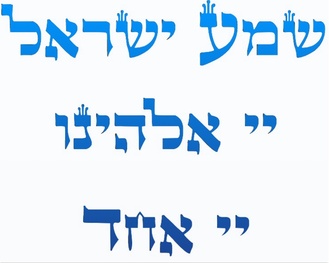| Do you remember the television series, Northern Exposure, about a young Jewish doctor living in a small town in Alaska? In one episode, the doctor, Joel Fleischman, needs to find ten Jews to form a minyan so he can say Kaddish for his Uncle Manny. When one candidate appears before him—a scruffy looking guy in an eskimo suit—the doctor doubts that the man is really Jewish. He challenges him with the only "Jew test" he can think of. He asks him to recite the Shema. |
שמע ישראל יי אלהינו יי אחד.
Shema Yisrael Adonai Eloheinu Adonai Echad. (Deuteronomy 6:4)
Those words appear in this week's Torah portion (Va'etchanan) as a part of a speech Moses delivers to the Israelites as they await their entry into the Land of Israel. He implores them to obey their God and remain loyal to God. Those words are part of every morning and evening service. They are the words that a Jew is supposed to say every night before going to sleep and the words that one is supposed to say on one's deathbed in preparation for the final passage.
You would think that there is consensus on what the words mean. There isn't.
Here is the translation of the Shema in the Union Prayerbook, the siddur my Temple used when I was a child:
"Hear, O Israel: The Lord our God, the Lord is One."
Do you hear the emphasis on the final word "One"? This is a statement of God's uniqueness; a declaration of monotheism and the belief that the universe is ruled by a single, authoritative law. There can be no competing system to determine what is right and what is wrong. There is only one God who is the foundation of all that is true and right. That's what my Sunday School teacher told me and it never occurred to me that the Shema could mean anything else.
That is, until I read this translation from the Jewish Publication Society translation of the Hebrew Bible:
"Hear, O Israel! The Lord is our God, the Lord alone."
The movement of the verb "is" changes the meaning of the verse considerably. This, now, is a statement of the attachment of God to God's people. Our identity is inextricably linked to the God who is ours. No other gods could ever be ours. We are defined by our national relationship with this God. Where the first translation is universal in its message, this translation is particular. The watchwords of our faith are not about the world; they are about our special and unique relationship with God.
To be fair, these two translations have very different purposes. The old Union Prayerbook wants to give people words to pray that will elevate their spirits and that will conform to their beliefs. The JPS translation seeks to convey the ancient meaning of the Hebrew as revealed by the study of its historical origin. Those differences in approach lead to real differences in translation.
Here is another translation to ponder. It comes from Mishkan T'filah, the prayerbook most recently published by the Reform Movement:
"Hear, O Israel, Adonai is our God, Adonai is One!"
This translation puts the verb in both places. God is both the particular deity attached to the Jewish people and the universal and unique God of all creation. Using "Adonai" instead of "The Lord" also has an impact. It reminds us of the Name by which the universal God is known in particular to the Jewish people. "Adonai" is not God's name—the Name is understood to be unknowable and unpronounceable—so the word also calls attention to the mystery that surrounds God.
Finally, here is one more interpretation of the Shema. It is offered by Rabbi Yehudah Aryeh Leib Alter of Ger, the Chasidic master known as the Sefat Emet. He wrote:
The meaning of 'Y-H-W-H is one' is not that He is the only God, negating other gods (though this too is true!), but the meaning is deeper than that: there is no being other than Him. [This is true] even though it seems otherwise to most people…everything that exists in the world, spiritual and physical, is God Himself. (Translation from Rabbi Arthur Green's These are the Words, p. 103)
The Sefat Emet espouses the most radical form of monotheism. Everything is God. We breathe God. We exist within God. We are part of God. The idea that God is, in any way, separate from us or from anything we experience is an illusion. There is nothing that God is not.
So, the next time you recite the Shema—whether at services or at bedtime, whether sung loudly or whispered, whether three-times-a-day or once-in-a-while, whether standing or sitting—you can try to wrap your mind around all of these meanings. We declare, at the core of our belief, that God is the one, true and universal source of all law. We declare that, as a people, we Jews have a unique relationship with our God. We declare that God is a mystery who simultaneously can be our intimate partner and the foundation of all. We declare that God is all.
This is our password for identifying God in our lives. While it is not a secret, its meaning is not apparent on the surface, either. It is not a test for discovering other Jews. It is a test to discover the Jew within ourselves.
Other Posts on This Topic:
Va'etchanan: Finding God
Treasured and Chosen
Vayakhel: Being Part of Something Bigger


 RSS Feed
RSS Feed
